|
|
|
Sort Order |
|
|
|
Items / Page
|
|
|
|
|
|
|
| Srl | Item |
| 1 |
ID:
157592
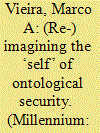

|
|
|
|
|
| Summary/Abstract |
In this article, I critically engage with and develop an alternative approach to ontological security informed by Jacques Lacan’s theory of the subject. I argue that ontological security relates to a lack; that is, the always frustrated desire to provide meaningful discursive interpretations to one’s self. This lack is generative of anxiety which functions as the subject’s affective and necessary drive to a continuous, albeit elusive, pursuit of self-coherence. I theorise subjectivity in Lacanian terms as fantasised discursive articulations of the Self in relation to an idealised mirror-image other. The focus on postcolonial states’ subjectivity allows for the examination of the anxiety-driven lack generated by the ever-present desire to emulate but also resist the Western other. I propose, therefore, to explore the theoretical assertion that postcolonial ontological security refers to the institutionalisation and discursive articulation of enduring and anxiety-driven affective traces related to these states’ colonial pasts that are still active and influence current foreign policy practices. I illustrate the force of this interpretation of ontological security by focusing on Brazil as an example of a postcolonial state coping with the lack caused by its ambivalent/hybrid self-identity.
|
|
|
|
|
|
|
|
|
|
|
|
|
|
|
|
| 2 |
ID:
181532
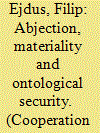

|
|
|
|
|
| Summary/Abstract |
Ontological security scholarship in International Relations (IR) has predominantly focused on the importance of social environments for the healthy sense of self. However, material environments can also provide an important source of ontological security. In my previous work I have argued that to assume this role of ‘ontic spaces’ material environments need to be discursively linked to states’ self-identity either through projection or introjection. In this article, I draw on the work of Julia Kristeva to argue that ontic spaces can also come about through abjection or the rejection of a material environment from the narrative of the self. I illustrate this theoretical point in the case study of the Serbian Orthodox Church of Christ the Saviour in Pristina. Its construction began in 1992 during the rule of Slobodan Milošević but was never finished due to the Kosovo war in 1998/9. Over the years, as all proposed changes are considered to be a threat to a healthy sense of self of either Serbs or Albanians, the building has been turned into an abjected ontic space, an ambiguous symbol undermining the self/other and victim/oppressor boundaries and as such both repels and attracts, threatens and protects.
|
|
|
|
|
|
|
|
|
|
|
|
|
|
|
|
| 3 |
ID:
186196
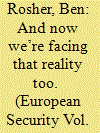

|
|
|
|
|
| Summary/Abstract |
Though conspicuous by its absence in debates among the British political and media establishments during the EU referendum campaign, the Irish border has been the central feature of Brexit as the implications and complications of trying to “take back control of borders” have become apparent. Drawing on focus group data gathered between 2017 and 2019 I employ ontological security theory to investigate the impact that Brexit is having on residents and communities living in the central Irish border region. In particular, I draw on the work of David Carr to explore the social role of memory and narrative in ontological (in)security and how this has manifested in the border region throughout the Brexit process. I find that the uncertainties generated by Brexit have caused border residents to draw on anxiety-filled memories and narratives from the securitised border of the pre-Good Friday Agreement era which they then project onto and vicariously through the next generation who, in turn, embody these anxieties, creating intergenerational ontological insecurity. Brexit has reintroduced, if not the physical border, the psychological borders of the past.
|
|
|
|
|
|
|
|
|
|
|
|
|
|
|
|
| 4 |
ID:
165906
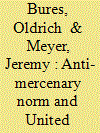

|
|
|
|
|
| Summary/Abstract |
This article offers an analysis of the influence of the anti-mercenary norm on the United Nations’ use of services provided by private military and security companies (PMSCs). It follows a constructivist approach which focuses on violations of the anti-mercenary norm within the UN system and on the justifications and condemnations of these violations in official UN documents. The findings suggest that while the anti-mercenary norm is no longer puritanical, two key aspects of the norm—the lack of a proper cause and the lack of control—remain influential within the UN system. Although all parts of the UN system nowadays routinely use a wide variety of services of PMSCs and the UN Secretary-General officially sanctioned security outsourcing in 2011, the UN continues to insist that it is only using PMSCs as a last resort, when no other options are available. The continuing need to justify the use of PMSCs’ services suggests that this practice challenges both the long-established identity of the UN as a key anti-mercenary norm entrepreneur and its ontological security.
|
|
|
|
|
|
|
|
|
|
|
|
|
|
|
|
| 5 |
ID:
189989
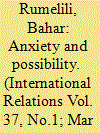

|
|
|
|
|
| Summary/Abstract |
This is the introduction to the forum, Anxiety and possibility: the many future(s) of COVID-19. It summarizes the contributions within a common framework and situates them in the extant literature.
|
|
|
|
|
|
|
|
|
|
|
|
|
|
|
|
| 6 |
ID:
189993
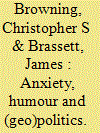

|
|
|
|
|
| Summary/Abstract |
Humour is usually overlooked in analyses of international politics, this despite its growing prevalence and circulation in an increasingly mediatised world, with this neglect also evident in the growing literature on ontological security and anxiety in IR. Humour, though, needs to be taken seriously, crossing as it does the high-low politics divide and performing a variety of functions. In the context of the Covid pandemic we argue that the link between humour and anxiety has been evident in three notable respects: (i) functioning as a (sometimes problematic) form of stress relief at the level of everyday practices of anxiety management, (ii) working to reaffirm biographical narratives of (national) community and status and (iii) most significantly for IR, as a form of anxiety geopolitics.
|
|
|
|
|
|
|
|
|
|
|
|
|
|
|
|
| 7 |
ID:
160621
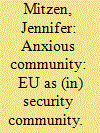

|
|
|
|
|
| Summary/Abstract |
From the Eurocrisis to the migration crisis, and from Brexit to a strengthening far right, the European Union (EU) faces multiple stressors. But while crises unleash anxiety, they do not necessarily portend the worst: because they disrupt old routines, crises can open space for new political possibilities. As a self-consciously hybrid, ‘post-national’ political form, the EU would seem poised to take advantage. Instead it is stuck. In this paper, taking an ontological security approach and focusing on EU migration governance, I propose that one cause of paralysis could lie – ironically – in an aspect of the EU that is crucial to its normative power: Europe’s long peace. An ontological security perspective highlights the management of existential anxiety as crucial to identity, suggesting how different modes of anxiety management have different political effects. Applied here, EU narratives and routines preserving ‘no war’ might suppress relations of structural power; they might mimic primitive defense mechanisms; or they might be symptoms pointing to unconscious processes keeping difficult knowledge – including colonial pasts – undealt with. I suggest how migration governance might manifest these mechanisms, contributing to the difficulties of desecuritising migration and linking its governance to EU values and institutions.
|
|
|
|
|
|
|
|
|
|
|
|
|
|
|
|
| 8 |
ID:
185524
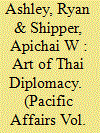

|
|
|
|
|
| Summary/Abstract |
This paper argues that a pragmatist theory of international relations, combined with parables of alliance formation from local proverbs and literary classics, best explains the art of Thai diplomacy from a historical perspective. Notably avoiding Western colonization, the Thais have enjoyed relative sovereignty and independence throughout their history. Rather than balancing, bandwagoning, or hedging, our study finds that Thailand has deliberately leveraged asymmetrical partnerships between often-opposed great powers and more symmetrical partnerships with less powerful states and multilateral organizations in order to maintain its physical and identity-based ontological security. We draw our empirical evidence from four historical periods: the nineteenth and early twentieth centuries, World War II, the Cold War, and the post-Cold War modern era. Our findings can be applied to other Southeast Asian states and their own parables of alliance.
|
|
|
|
|
|
|
|
|
|
|
|
|
|
|
|
| 9 |
ID:
180458
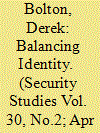

|
|
|
|
|
| Summary/Abstract |
Scholarship on ontological security (OS), the security of being, reveals how national narratives delineate communities within which individuals have OS and how the corresponding self-interest in upholding these narratives influences foreign policy. A hereto-unexplored implication of these works is how the desire to maintain national narratives influences decisions on balancing and bandwagoning. The article uses Raymond Aron’s classical realism to develop an OS theory of balancing, drawing upon what it argues are his “early OS intuitions.” Specifically, using Aron’s concept of “secular religion,” the article shifts the analytical focus of current ideological approaches of balancing toward the “secular religion” of nationalism. It argues decisions on balancing and bandwagoning are made with reference to perceived (in)compatibility between national narratives and the distribution of power. The case of North Korean responses to the Sino-Soviet split demonstrates the utility of an OS perspective on balancing compared to traditional balance of power formulations.
|
|
|
|
|
|
|
|
|
|
|
|
|
|
|
|
| 10 |
ID:
160618
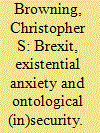

|
|
|
|
|
| Summary/Abstract |
This article explores how the Brexit Referendum on the UK's membership of the European Union has been a source of destabilisation, dread and ontological anxiety. Focusing mainly on British citizens who voted or self-identified as “Remainers”, and on EU foreign nationals resident in the UK, it shows how existential anxieties have had different points of focus for different groups of people. Confronted with such destabilising anxieties, the article shows how people have adopted different mechanisms designed to reassert a sense of order and certitude often viewed as central to preserving ontological security. The ways in which this has been done, however, can themselves raise important questions.
|
|
|
|
|
|
|
|
|
|
|
|
|
|
|
|
| 11 |
ID:
197249


|
|
|
|
|
| Summary/Abstract |
Ontological security-seeking has traditionally been considered to rest upon the stability and continuity of core auto-biographical narratives and everyday routines. ‘Critical situations’ which fundamentally destabilise these foundations of ontological security have thus hitherto carried a negative valence. Constitutional referenda proposing a radical re-organisation of collective political identities and daily life, therefore, are intriguing. A source of severe consternation for some, for others, potential change is positive, even thrilling. This article investigates this puzzling contrast, drawing on Ontological Security Studies’ (OSS) recent recentring of Existentialist thought and debates exploring the heterogenous potential of anxiety, and utilising the 2014 referendum on Scottish independence and the strategies for anxiety management embedded in the pro-independence ‘Yes’ campaign. Through analysis of dominant discourses grounding the argument for independence, findings demonstrate the simultaneous deployment of contradictory anxiety management strategies: independence was framed as a pathway to escape the instability and uncertainty of the status quo; as a pathway to continuity; and as a chance to embrace anxiety, to relish the opportunity and excitement of change. This article thus contributes to the prevailing critique of OSS’ over-privileging of stability and continuity in ontological security-seeking, yet problematises ‘either/or’ approaches to understanding anxiety management in critical situations and beyond.
|
|
|
|
|
|
|
|
|
|
|
|
|
|
|
|
| 12 |
ID:
166892
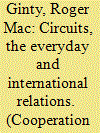

|
|
|
|
|
| Summary/Abstract |
The primary aim of this article is methodological. It proposes circuitry as an analytical device – not a mere metaphor – as a way of connecting the everyday and the hyper-local to the national, international, transnational and all levels in between. Thus, the article is concerned with international relations’ perennial levels of analysis problem. The study is prompted by empirical research from the Everyday Peace Indicators project in which research subjects narrated their own (in)security in terms of the home and the immediate vicinity of the home. The home can be regarded as a key part of everyday and ontological security for many people, but how do we connect this to the international and transnational? The article draws on the literature on engineered and biological circuits in order to propose a novel analytical device with which to emphasise the connectivity between apparently unconnected levels. A life history is used to illustrate how the analytical device might be operationalised.
|
|
|
|
|
|
|
|
|
|
|
|
|
|
|
|
| 13 |
ID:
160620
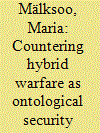

|
|
|
|
|
| Summary/Abstract |
What are the ethical pitfalls of countering hybrid warfare? This article proposes an ontological security-inspired reading of the EU and NATO’s engagement with hybrid threats. It illustrates how hybrid threat management collapses their daily security struggles into ontological security management exercise. This has major consequences for defining the threshold of an Article 5 attack and the related response for NATO, and the maintenance of a particular symbolic order and identity narrative for the EU. The institutionalisation of hybrid threat counteraction emerges as a routinisation strategy to cope with the “known unknowns”. Fostering resilience points at the problematic prospect of compromising the fuzzy distinction between politics and war: the logic of hybrid conflicts presumes that all politics could be reduced to a potential build-up phase for a full-blown confrontation. Efficient hybrid threat management faces the central paradox of militant democracy whereby the very attempt to defend democracy might harm it.
|
|
|
|
|
|
|
|
|
|
|
|
|
|
|
|
| 14 |
ID:
165332
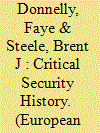

|
|
|
|
|
| Summary/Abstract |
This article makes a case for incorporating the concept of ‘Critical Security History’ (CSH) into security studies. While history plays a powerful role in a cornucopia of security stories, we contend that it often goes unnoticed in scholarly research and teaching. Against this backdrop, we present a detailed guide to study how history is told and enacted in non-linear ways. To do this, the article outlines how CSH can contribute to securitisation and ontological security studies. As shown, this lens casts a new light on the legacies of (de)securitisation processes and how they are commemorated. It also illustrates that ontological security studies have only begun to call into question the concept of historicity. Working through these observations, the article marshals insights from Halvard Leira's notion of ‘engaged historical amateurism’ to entice scholars interested in ‘doing’ CSH. While acknowledging that this research agenda is hard to achieve, our study of the 2012 Sarajevo Red Line project helps to illustrate the added value of trying to ‘do’ CSH in theory and in practice. We end with some reflections for future research and continued conversations.
|
|
|
|
|
|
|
|
|
|
|
|
|
|
|
|
| 15 |
ID:
195375


|
|
|
|
|
| Summary/Abstract |
The role of performance in ontological security seeking is underdeveloped, despite the fact that many elements of such behaviour – narratives, rituals, routinised meetings – carry a distinctive performative quality. Drawing on Butlerian performance theory, this article makes the case that performances are essential to re-establishing coherence and a sense of self following ontologically critical situations. The reproduction of the self, especially while directly addressing fundamental existential questions, is an important way to overcome critical situations. At the state level, this reproduction of self also includes a reproduction of the international system, a task which is best enacted in everyday diplomatic practice. To explore this theory, I use Brexit as an illustrative case study. Brexit was a moment of profound crisis for the United Kingdom (UK) and an ontologically critical situation. It forced the UK to reposition itself on the world stage and confront significant challenges to its self-understanding. In Westminster, these efforts centred on ‘Global Britain’ – a narrative shift that bridged the identity gap and provided a thin framework for foreign policy. At the same time, British diplomats were tasked with international realignment post-Brexit. In this way, everyday diplomatic practice became Brexit performances.
|
|
|
|
|
|
|
|
|
|
|
|
|
|
|
|
| 16 |
ID:
188386
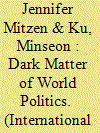

|
|
|
|
|
| Summary/Abstract |
International relations theory has had a trust revival, with scholars focusing on how trust can enhance interpersonal cooperation attempts between leaders. We propose there is another type of trust at play in world politics. International system trust is a feeling of confidence in the international social order, which is indexed especially by trust in its central unit, state persons. System trust anchors ontological security, and its presence is an unstated assumption of the international relations trust scholarship. In this paper we conceptualize system trust. We illuminate its presence by flagging the production of state personhood in a familiar case in international relations trust scholarship, the 1985 Geneva Summit between Reagan and Gorbachev. Interpersonal and system trust perspectives highlight different aspects of the same summit. The juxtaposition suggests new lines of research into the production of state persons in diplomacy, the relationship between interpersonal and system trust, and the impact of the rise of personalistic/patrimonial leadership on diplomacy and international order.
|
|
|
|
|
|
|
|
|
|
|
|
|
|
|
|
| 17 |
ID:
194347


|
|
|
|
|
| Summary/Abstract |
The dispute over the Diaoyu/Senkaku Islands is generally analysed as a Sino-Japanese competition over material and strategic interests, regional preponderance, and nationalistic symbolism. Yet, such explanations cannot fully explain the endurance of the conflict and overlook its origin in the period leading up to the UN’s derecognition of Taiwan’s sovereignty in 1971. Drawing on the concept of ontological security, defined as ‘security of the self’, we contend that it was the looming loss of its sovereign self that prompted Taiwan (Republic of China, ROC) to assert itself as the true defender of Chinese interests by laying claim to the islands. This caused anxiety in China (People’s Republic of China, PRC), which had to follow suit in order to secure its own sovereign self. China thus inherited the conflict with Japan when it took over the ‘true China’ mantle upon its entry to the UN in 1971. Extant explanations overlook the important factor of inter-Chinese competition over sovereign selfhood. In developing this argument, the article makes two contributions. First, it draws attention to a much-overlooked early phase of the dispute, and shows how the same dynamics of ROC–PRC status competition continue to inform the dispute between China and Japan today. Second, it contributes to the literature on ontological security by conceptualising the ‘self’ as sovereign state personhood, thereby further clarifying the distinction between self and identity, and highlighting the relational effects of ontological security-seeking.
|
|
|
|
|
|
|
|
|
|
|
|
|
|
|
|
| 18 |
ID:
169781
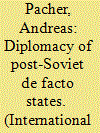

|
|
|
|
|
| Summary/Abstract |
Why do post-Soviet de facto states (such as Abkhazia and South Ossetia) regularly interact with remote Pacific islands or Latin American countries, even though they are not bound by any meaningful political, economic or military ties? This article argues that the diplomatic relationship management amounts to a strategy of external legitimacy-building through stigma rejection and ontological security-attainment. This diplomatic practice creates positively tinged social affiliations, whereby the unrecognized entities aim to have their identity as ‘normal’ states affirmed. It renders the international society’s stigma ineffective, thus facilitating a potential exit from the stigma. By illuminating the performative aspects behind the de facto states’ quest for recognition, this article uncovers the de facto states’ agency and analytically emancipates them from the structural factor of ‘Russia-as-a-great-power’. It also contributes to the literature of ontological security by highlighting how positive (rather than conflictual) relationships, and how transformed (rather than stable) identities can be conducive to its attainment. This article generally highlights the need to analyse de facto states’ foreign relations more holistically than previously done.
|
|
|
|
|
|
|
|
|
|
|
|
|
|
|
|
| 19 |
ID:
175362
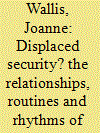

|
|
|
|
|
| Summary/Abstract |
This article considers what treating individual international interveners engaged in peacebuilding work as referent objects can tell us about emplaced security. This is important because individual interveners are diverse, embodied agents who can impact the agency, peace and security of conflict-affected populations. It argues that applying an ontological security lens can provide a partial explanation for why interveners develop narratives and perform practices, including why they sometimes identify and behave in counterproductive, and even damaging, ways. The final section considers why an analytical focus on place is valuable, noting that place-based experiences and place-identities are formative of ontological security. It argues that treating interveners as a referent object provides opportunities to rethink the tendency to focus on home as the key site of emplacement in the ontological security literature. Building on this, it argues that examining the emplaced security of interveners invites us to examine the political nature and consequences of interveners’ physical and ontological security-seeking narratives and practices, including their creation of the material and ideational structures of intervention spaces and places.
|
|
|
|
|
|
|
|
|
|
|
|
|
|
|
|
| 20 |
ID:
151182
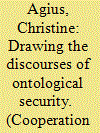

|
|
|
|
|
| Summary/Abstract |
The controversy of the Danish cartoon crisis in 2006 overshadowed a similar one that took place in Sweden a year later. The crises have broadly been framed as a clash of values but both cases reveal differences worthy of investigation, namely for the complex tensions and convergences between the two states on questions of immigration, Nordic solidarity and national identity. This article aims to explore the intersubjective discourses of identity that were threaded through the debates on the cartoon crises, looking to the overlapping discourses that have constructed ideas of identity in terms of ontological security, or security of the self. It argues that both cartoon crises represent a complex discursive performance of identity that speaks to a broader set of ontological security concerns which intersect at the international, regional and national levels. Even in their differences, Swedish and Danish discourses show the tensions associated with the desire for a stable and consistent idea of self when contrasted with the Muslim ‘other’, explored in the context of discourses of modernity and tolerance, which operate as key sites that work to reiterate, reclaim and reinstate the idea of the progressive state.
|
|
|
|
|
|
|
|
|
|
|
|
|
|
|
|
|
|
|
|
|